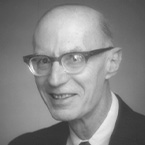
Alan S. Rabson, MD, a former deputy director of the National Cancer Institute and a longtime member of the AACR whose work in virology spanned six decades, died July 4, 2018, at the age of 92.
Rabson was born in 1926, in Brooklyn, New York. He earned his bachelor’s degree from the University of Rochester and his medical degree at the State University of New York.
During the Korean War, Rabson joined the Public Health Service’s Commissioned Corps, through which he studied virology and pathology. In 1955, he became a pathologic anatomy resident at the National Institutes of Health (NIH), and shortly thereafter, became a staff member at the Laboratory of Pathology at the National Cancer Institute (NCI).
In 1975, Rabson was named director of what is known today as the NCI’s Division of Cancer Biology. During his tenure as director, the division expanded its role in managing the funding of cancer research performed by NCI-supported investigators across the country.
In 1995, Rabson was named deputy director of the NCI, a post he held until he retired in 2015. He was then named a scientist emeritus at the NCI. Rabson also held clinical professorships at George Washington University and Georgetown University and authored more than 100 scientific journal articles.
Throughout his career, Rabson was renowned for the relationships he forged with patients and his commitment to helping them secure the best possible treatments. With his dry sense of humor and quick wit, he was generous with his time and expertise and will be remembered as a wise mentor to several generations of scientists. For decades, Rabson’s leadership, commitment, and compassion helped shape the NCI’s vision.
Among countless professional honors, the NIH has bestowed in his name the Alan S. Rabson Award for Clinical Care annually since 2012. He was preceded in death by his wife, Ruth Kirschstein, MD, a pathologist who also had an esteemed career at the NIH.
Rabson became a member of the AACR in 1965 and transferred to Emeritus membership in 2006.
”Alan Rabson’s extraordinary career encompassed important work in the lab as well as dynamic leadership at the NCI,” said Margaret Foti, PhD, MD (hc), chief executive officer of the AACR. “We were privileged to have him as an AACR member for 53 years, and we are grateful for his significant contributions to the field of cancer research.”
Be the first to add a Remembrance.